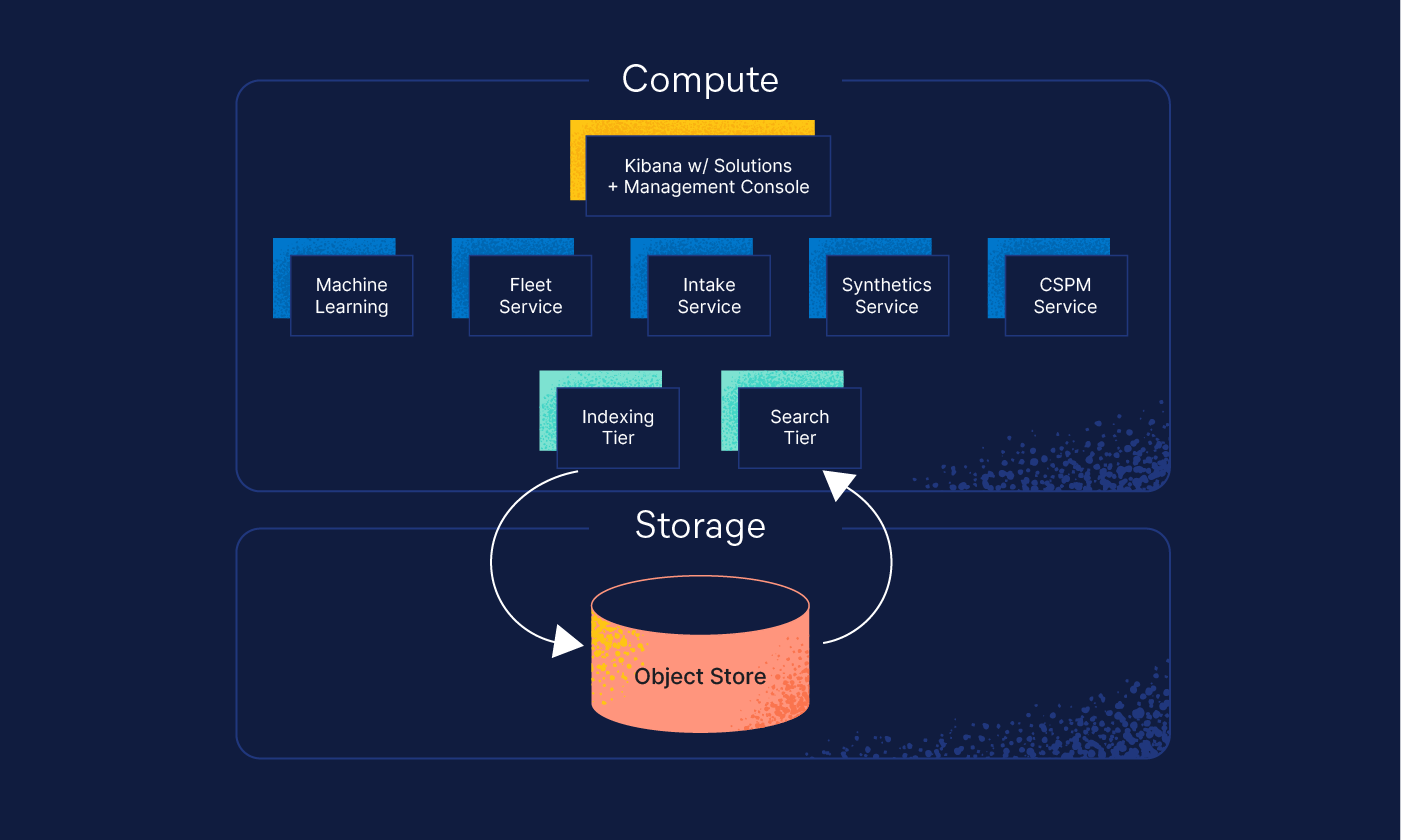

Pricing
Elastic Cloud Serverless
Build powerful search experiences, monitor cloud native environments with ease, and enhance security with AI-driven analytics. Enjoy simplified APIs, workload-based autoscaling, and no infrastructure management hassle. Get started quickly and pay only for what you use.
Elasticsearch Serverless pricing components
Elasticsearch Serverless charges separately for compute resources scaled to your workloads and storage. Compute resources are measured in Virtual Compute Units (VCUs). One VCU contains 1GB of RAM and corresponding compute resources. Storage is measured in GB. Pricing should be performance driven. Scale effortlessly as your workloads grow, paying only for the compute resources that meet your latency and throughput goals.
Virtual Compute Unit (VCU)
Compute resources are measured in VCUs and scale to your workloads and performance needs. One VCU contains 1GB of RAM and corresponding compute resources.
VCUs are specialized for different tasks: Ingest VCUs index data into the Search AI Lake, Search VCUs handle search queries against data in the Search AI Lake, and Machine Learning VCUs handle inference and ELSER workloads as well as machine learning jobs.
Adaptive resource provisioning
Resources are intelligently provisioned to match your workloads.
Ingest and ML compute resources scale to accommodate respective workloads.
Search compute resources also scale dynamically with search workloads, and are sized by default to deliver great search performance and ensure consistent responsiveness at all times. You have flexibility to adjust Search Power settings, and full control over responsiveness and resource allocation when search workloads are absent or low.
Storage & retention
Elasticsearch Serverless uses object stores for persistent storage in the Search AI Lake.
All data, regardless of type, recency, and frequency of use, is accessible from the Search AI Lake. The size of the Search AI Lake can be controlled with manual or managed data retention policies.
Storage is measured in GB.
Pricing details
General purposeBest for general search use cases across various data types. Try for freeIngest
$0.14 Per VCU-hour
Ingest VCUs for indexing data Search
$0.09 Per VCU-hour
Search VCUs for querying data Machine Learning
$0.07 Per VCU-hour
Machine Learning VCUs for trained models and ML jobs Storage
$0.047 Per GB-month
Persistent storage in Search AI Lake Egress
$0.05 Per GB
Data transfer out of project 50 GB monthly allowance per organization |
Vector searchBest for semantic search use cases using vectors with near-real-time retrieval. Try for freeIngest
$0.14 Per VCU-hour
Ingest VCUs for indexing data Search
$0.09 Per VCU-hour
Search VCUs for querying data Machine Learning
$0.07 Per VCU-hour
Machine Learning VCUs for trained models and ML jobs Storage
$0.047 Per GB-month
Persistent storage in Search AI Lake Egress
$0.05 Per GB
Data transfer out of project 50 GB monthly allowance per organization |
Time seriesBest for retention and analysis of high volume time series data, such as logs of other data streams. Ingest
Coming soon
Ingest VCUs for indexing data Search
Coming soon
Search VCUs for querying data Machine Learning
Coming soon
Machine Learning VCUs for trained models and ML jobs (Per VCU-hour) Storage
Coming soon
Persistent storage in Search AI Lake (Per GB-month) Egress
Coming soon
Data transfer out of project 50 GB monthly allowance per organization |
|
| IngestIngest VCUs for indexing data | $0.14 Per VCU-hour |
$0.14 Per VCU-hour |
Coming soon |
| SearchSearch VCUs for querying data | $0.09 Per VCU-hour |
$0.09 Per VCU-hour |
Coming soon |
| Machine LearningMachine Learning VCUs for trained models and ML jobs | $0.07 Per VCU-hour |
$0.07 Per VCU-hour |
Coming soon |
| StoragePersistent storage in Search AI Lake | $0.047 Per GB-month |
$0.047 Per GB-month |
Coming soon |
| EgressData transfer out of project 50 GB monthly allowance per organization |
$0.05 Per GB |
$0.05 Per GB |
Coming soon |
Support package
Limited support is included with a Standard subscription; all other support pricing is based on the percentage of your consumption. For more information on what's included in each support level, please go to elastic.co/support.
| Elastic Cloud organization subscription level* | Standard | Gold | Platinum | Enterprise |
|---|---|---|---|---|
| Support and total bill | ||||
| Support level | Limited | Base | Enhanced | Premium |
| % of charge | Included | 5% | 10% | 15% |
*Subscription level is selected during sign up
Frequently asked questions
Serverless projects use the core components of the Elastic Stack, such as Elasticsearch and Kibana, and are based on Elastic’s Search AI Lake architecture that decouples compute and storage. Search and indexing operations are separated, which offers flexibility for scaling your workloads while ensuring a high level of performance.
Enjoy the following benefits with Elasticsearch Serverless:
- Management free. Elastic manages the underlying Elastic cluster, so you can focus on your data. With serverless projects, Elastic is responsible for automatic upgrades, data backups, and business continuity.
- Autoscaled. To meet your performance requirements, the system automatically adjusts to your workloads.
- Optimized data storage. Your data is stored in the Search Lake of your project, which serves as a cost-efficient and performant storage. A high performance layer is available on top of the Search Lake for your most queried data.
- Pay for the performance you need. Pay for ingest, search, and ML resources separately as needed by the workloads you run.
Elastic Cloud is a powerful platform that accommodates many computing needs. Serverless projects are purpose built for use cases while providing a fully managed autoscaled experience. This specialization and operational model is what sets serverless apart today.
Elasticsearch Serverless is currently available on select Cloud provider regions, with some features yet to come in the future. We are fully invested in expanding our serverless offering to more regions and cloud providers. We recommend checking the documentation for technical compatibility such as security, compliance, and availability.
It's simple to get started on Elasticsearch Serverless:
- Create Elasticsearch Serverless projects in the Cloud Console
- Choose the use case-optimized project type that is most fitting for your needs
- Get started with your use-case optimized project experience
We recommend sending data directly from your application or using Connector clients. For sending data in an existing Elasticsearch instance, we recommend using Logstash to migrate large volumes.
Search Power settings allow you to manage the compute resources to optimize search performance (throughput and latency) and manage costs. There are three Search Power settings for Elasticsearch Serverless projects. The Performant setting is on by default, and provides performant search experience for data of all sizes. It is possible to choose any one of the following settings:
On-demand: Autoscales based on data and search load with a lower minimum baseline for resource use. This flexibility results in more variable query latency and reduced maximum throughput.
Performant: Delivers consistently low latency and will autoscale to accommodate moderately high query throughput
High-throughput: Optimized for high-throughput scenarios, autoscaling to maintain query latency even at very high query volumes
In Elasticsearch Serverless, you pay for the resources used to handle your workloads and performance needs. We have a few examples to give you an idea about what you could pay, and how to think about costs.
Example 1 - Dev environment with 2GB searchable data, 1% ingest utilization (15 minutes per day), 8% search utilization (2 hours per day)
- On-demand: $24/month
- Performant: $27/month
Example 2 - Prod environment with 20GB searchable data, 5% ingest utilization (1 hour per day), 33% search utilization (8 hours per day)
- On-demand: $190/month
- Performant: $210/month
*The pricing estimates provided in the examples are for illustrative purposes only. Actual costs may vary based on factors such as data type, query complexity, traffic patterns, usage duration, and specific configurations. These estimates are intended to help you understand potential pricing scenarios but should not be relied upon as a final cost. For precise cost calculations, we recommend monitoring your usage.




